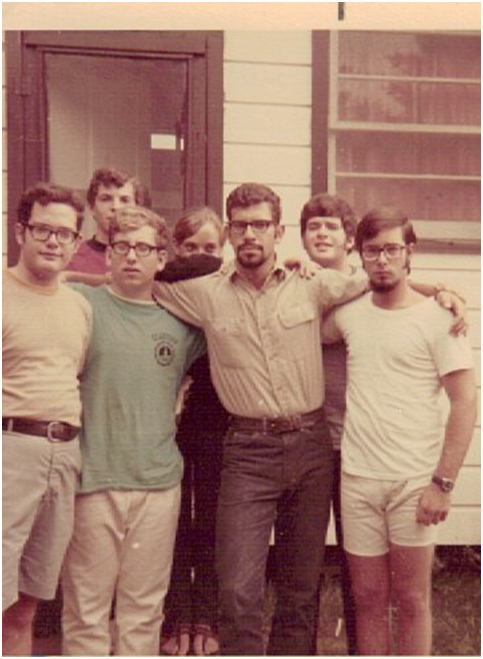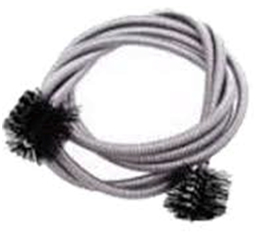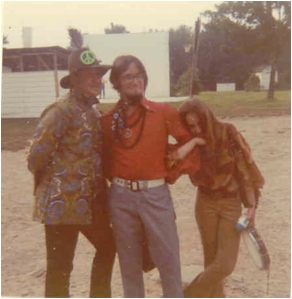Empire State Music Camp Waiter’s Bunk (Stalag 16), circa 1968.
2. The High School Years
Summers were spent in the Catskill Mountains at the shabby but awesome Empire State Music Camp, tucked away in a tiny town called Hurleyville in upstate New York. During the early “Borsht Belt” years, this location was a frequented hotel/casino called “Kramer’s on Luzon Lake,” that often featured notorious comedians like Buddy Hackett and Lenny Bruce. I spent five summers there and loved it so much I began packing the family trunk 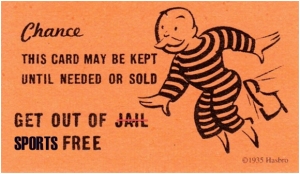 and my father’s army duffle bag in January of each year. I can only describe this place as a musician’s “heaven on earth.” The first half of each day was total immersion in music activities. E.S.M.C. offered choir, concert band, jazz band, chamber orchestra, an occasional brass or woodwind quintet and there were always blocks of time reserved throughout the day for practicing your instrument. The campgrounds were speckled with little do-it-yourself piano sheds and there was a main “house” where concerts took place nightly. Afternoon activities included the usual menu of Bb camp sporting events but since it was primarily a music camp run by a fervent commandant, we were gifted with unlimited “get-out-of-sports-free” cards that were good for the entire summer!
and my father’s army duffle bag in January of each year. I can only describe this place as a musician’s “heaven on earth.” The first half of each day was total immersion in music activities. E.S.M.C. offered choir, concert band, jazz band, chamber orchestra, an occasional brass or woodwind quintet and there were always blocks of time reserved throughout the day for practicing your instrument. The campgrounds were speckled with little do-it-yourself piano sheds and there was a main “house” where concerts took place nightly. Afternoon activities included the usual menu of Bb camp sporting events but since it was primarily a music camp run by a fervent commandant, we were gifted with unlimited “get-out-of-sports-free” cards that were good for the entire summer!
Nights at E.S.M.C. were reserved for concerts, jam sessions, rehearsals or, in my case, getting into hot water-actually cold water. In addition to being a single-minded musician on a crusade, I soon became an inventor of sorts at E.S.M.C. with a proclivity for designing water balloon traps that I furtively installed in the boy’s bunk bathrooms. But no matter how plausible my designs appeared on paper, I got drenched every attempt at rigging those aqueous contraptions: 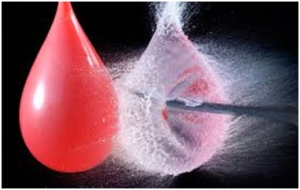
I think I fell in love just about every summer-yes, in that way, of course, but also with the idea of playing musical instruments in addition to the trumpet. During my first summer at E.S.M.C. we had a terrific drummer in the stage band that could really play! I was so impressed with this 15 year-old that when I returned home after camp ended, I immediately asked my father for a drum set to fool around with. Dad was a trap-set veteran himself and a real Gene Krupa  fan as a kid so it was an easy sell. We purchased a classic champagne sparkle Slingerland kit and it t took me only a few months to transform what I had heard Richie play into my own legerdemain. The following July I returned to E.S.M.C. with trumpet in hand but also a pair of Jake Hanna jazz drumsticks tucked away in my trunk. When I arrived I was delighted to learn that the stage band needed a drummer that particular summer. I already knew all the charts so it was a no-brainer to let me to take the drummer’s throne. By my third summer, pop/rock music was in an all-time uproar (much to my dismay) that began to draw “plebian” guitar players and drummers to my secret summer sanctum. A few decent jazzers arrived, however, so I reluctantly returned to my desperate world of “hamburger-chops” and “mouthpiece-madness” (playing drums in comparison was effortless).
fan as a kid so it was an easy sell. We purchased a classic champagne sparkle Slingerland kit and it t took me only a few months to transform what I had heard Richie play into my own legerdemain. The following July I returned to E.S.M.C. with trumpet in hand but also a pair of Jake Hanna jazz drumsticks tucked away in my trunk. When I arrived I was delighted to learn that the stage band needed a drummer that particular summer. I already knew all the charts so it was a no-brainer to let me to take the drummer’s throne. By my third summer, pop/rock music was in an all-time uproar (much to my dismay) that began to draw “plebian” guitar players and drummers to my secret summer sanctum. A few decent jazzers arrived, however, so I reluctantly returned to my desperate world of “hamburger-chops” and “mouthpiece-madness” (playing drums in comparison was effortless).
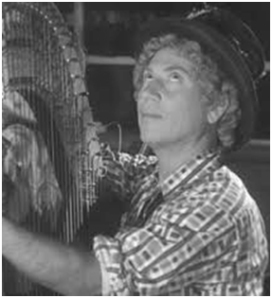 That fall, my family moved to New York City where I enrolled in the High School of Performing Arts and was placed solo chair of the trumpet section in the first level concert band (there were 4 levels). I studied ear training 5 days a week and enjoyed playing in a brass quintet every morning. Before band I would sneak into the harp chamber and do my impression of Arthur Marx.
That fall, my family moved to New York City where I enrolled in the High School of Performing Arts and was placed solo chair of the trumpet section in the first level concert band (there were 4 levels). I studied ear training 5 days a week and enjoyed playing in a brass quintet every morning. Before band I would sneak into the harp chamber and do my impression of Arthur Marx.
But despite my innate talent and all the arduous training offered there, for me, the peer pressure was so overwhelming that I almost collapsed during my performance of the first movement of the Haydn Trumpet Concerto. In retrospect, I learned a lot from that awful experience but to this day I still flinch every time I hear “the Haydn.”
 While the trumpet debacle continued, my thirst for playing drums led me to join the Metropolitan Jazz Quartet for weekend excursions to the land of New Jersey. I also played trumpet in a rugged soul band during that time but despite a nascent interest in Lee Morgan & Freddie Hubbard, it was the Oscar Peterson Trio that stole my heart, in particular, kingpins Ed Thigpen & Ray Brown. Ed’s unwavering time and sumptuous brushwork blew me away but I always kept one ear tuned to the cohesive “triplety” bass lines played by the amazing Ray Brown. One day at school, I bumped into a classmate who was selling his acoustic bass for $150. Without seeing or trying the merchandise I paid him the meager sum and he even delivered the bass to my apartment that night with a bow and a frayed copy of Franz Simandl’s “Method For the Double Bass.” I quickly learned first position fingerings and how to read bass clef more fluently. I had enough Ray Brown & Ron Carter in me to plunk along with some “Music Minus One” recordings my mom had from her voice lessons and within a few months, I was good enough to join a rehearsal big band just a few blocks away on West End Avenue.
While the trumpet debacle continued, my thirst for playing drums led me to join the Metropolitan Jazz Quartet for weekend excursions to the land of New Jersey. I also played trumpet in a rugged soul band during that time but despite a nascent interest in Lee Morgan & Freddie Hubbard, it was the Oscar Peterson Trio that stole my heart, in particular, kingpins Ed Thigpen & Ray Brown. Ed’s unwavering time and sumptuous brushwork blew me away but I always kept one ear tuned to the cohesive “triplety” bass lines played by the amazing Ray Brown. One day at school, I bumped into a classmate who was selling his acoustic bass for $150. Without seeing or trying the merchandise I paid him the meager sum and he even delivered the bass to my apartment that night with a bow and a frayed copy of Franz Simandl’s “Method For the Double Bass.” I quickly learned first position fingerings and how to read bass clef more fluently. I had enough Ray Brown & Ron Carter in me to plunk along with some “Music Minus One” recordings my mom had from her voice lessons and within a few months, I was good enough to join a rehearsal big band just a few blocks away on West End Avenue.
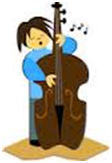 When I returned to my haven the following summer, as fate would have it, there was a need for a double bass player in the counselor’s string quartet. Expecting to play trumpet and/or drums that year, I didn’t think of bringing my newly acquired toy. Fortunately the music director was able to procure an aluminum double bass and a cello bow from somewhere in the bowels of Hurleyville. When the cellist handed me the music, I almost flipped when I saw the title of the piece they wanted to perform at the final camp concert: the first Allegro from Mozart’s Eine Kleine Nachtmusik! Amadeus probably had a good laugh over this one-for all
When I returned to my haven the following summer, as fate would have it, there was a need for a double bass player in the counselor’s string quartet. Expecting to play trumpet and/or drums that year, I didn’t think of bringing my newly acquired toy. Fortunately the music director was able to procure an aluminum double bass and a cello bow from somewhere in the bowels of Hurleyville. When the cellist handed me the music, I almost flipped when I saw the title of the piece they wanted to perform at the final camp concert: the first Allegro from Mozart’s Eine Kleine Nachtmusik! Amadeus probably had a good laugh over this one-for all  I know he even planned it when I fell in love with his piece as a toddler, running around the house imitating a fervent violinist. (I can’t imagine where I got that image from…)
I know he even planned it when I fell in love with his piece as a toddler, running around the house imitating a fervent violinist. (I can’t imagine where I got that image from…)
With “bumps of the goose” and only eight weeks to learn how to simulate arco and play the notes correctly, I began a daily regimen of rigorous practice. It took me several days before I could play the first four measures in tune but the cello bow actually made it a bit easier. The concert went extremely well and I was very pleased with the work I had accomplished in such a short time. I also realized I had to start making choices as my daily practice schedule was becoming unmanageable.
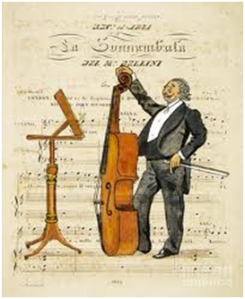 The final summer at E.S.M.C. was a significant turning point in my life although it wouldn’t be realized until much later. I received a full scholarship to play trumpet, bass and drums as needed in the concert band, jazz band and orchestra. I also conducted a woodwind quintet after gleefully discovering the score to Gounod’s “Funeral March of a Marionette,” which was the sinister but very catchy theme used to underscore the Alfred Hitchcock Hour on TV. But my musical life was destined for yet another path that summer as the drama folks scheduled Gilbert & Sullivan’s operetta, “The Mikado,” for the camp’s final extravaganza. Inducted against my will, I was appropriately chosen to play the part of Pooh Bah who was Lord High Everything in the fantasyland of Titipu. While this role was a perfect fit for my teenage arrogance and vitriol, I had some reservations about singing, especially when coupled with acting and in a lead role to boot!
The final summer at E.S.M.C. was a significant turning point in my life although it wouldn’t be realized until much later. I received a full scholarship to play trumpet, bass and drums as needed in the concert band, jazz band and orchestra. I also conducted a woodwind quintet after gleefully discovering the score to Gounod’s “Funeral March of a Marionette,” which was the sinister but very catchy theme used to underscore the Alfred Hitchcock Hour on TV. But my musical life was destined for yet another path that summer as the drama folks scheduled Gilbert & Sullivan’s operetta, “The Mikado,” for the camp’s final extravaganza. Inducted against my will, I was appropriately chosen to play the part of Pooh Bah who was Lord High Everything in the fantasyland of Titipu. While this role was a perfect fit for my teenage arrogance and vitriol, I had some reservations about singing, especially when coupled with acting and in a lead role to boot!
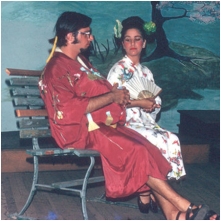
Bob playing the part of Pooh Bah in the E.S.M.C. rendition of Gilbert & Sullivan’s “The Mikado,” circa 1968.
[please!] Given a choice, I would have naturally migrated to the “pit” where I could share my expertise with the orchestra and remain invisible, allowing the gaggle of hapless actors to fend for themselves on stage. Now the pressure was really on! I had to add singing, dancing and acting to my repertoire of musical tricks and that meant earning my scholarship by playing all day and at night memorizing lines, cues, choreography and Gilbert & Sullivan’s wonderful ditties that were lyrical but rather complicated. The show was a success and little did I know that my role in it was the shape of things to come!
By my senior year of Performing Arts I had managed to maintain first chair trumpet status when I was recruited to the senior orchestra, concert band and even all-city band despite my having become an emotional basket case. In retrospect, I suppose I should have requested a demotion but instead exempted myself from playing some great trumpet solos including both on-stage and off-stage passages from Prokofiev’s Lieutenant Kije Suite and Copland’s Outdoor Overture. The latter was a commissioned work Aaron wrote for our school and to make matters worse for me, he decided to attend the premier performance in 1969 and, of course, the entire school population filled the hall for this special event!! Seconds before the downbeat I completely froze, turned to the guy who should have sat first chair and quietly offered him the chance he deserved to shine (and save my ass!). He accepted my offer in a heartbeat and played it beautifully while I sank into my chair. The conductor never said anything to me about what happened. Looking back, though, I know I did the right thing because this young man was a better player than me and everyone knew it. But for some strange reason his talent and ability remained invisible to the teachers who determined the pecking order of each section in all ten of the bands and orchestras. I will never understand why there were no auditions or “chair challenges” possible at Performing Arts. To this day, I still garrot myself with a trumpet leadpipe snake daily for blowing that once-in-a-lifetime opportunity. On the other hand, there were at least 40 other trumpet players who never even had the opportunity. Completely
frazzled after graduation (ironically celebrated at Carnegie Hall) and a hopeless audition for the Manhattan School of Music, I sold all my instruments and fled to New Jersey where I took up residence in a $10/week dump. Swearing off music, I took a job delivering pizzas for a small mom & pop franchise called “Chicken Delight.”
One anecdote of note before I take you to the Garden State: I strongly believe in cosmic messages and there was one in particular, quite relevant to this story, which I ignored. On the way home from a trumpet lesson one afternoon in lovely uptown Manhattan, I was accosted by two lowlifes. One surprised me from behind and held a knife to my gut while his partner in crime executed a frontal assault by sharing the handle of the case that swaddled my horn. After a brief tug-o-war, the back up dude calmly said in my ear, “You don’t want that horn now, do-you-boy?” Trained for this sort- of (sordid) thing, he increased the knife pressure and since I didn’t really want a second navel, I had no choice but to donate my Vincent Bach Stradivarius (not a Mt. Vernon, thank de lawd) with the first and third valve triggers to a bad cause. But that blade-wielding messenger was absolutely correct! I’m also glad I was smart enough not to resist otherwise I probably would have been dissected into tiny mouthpieces…
of (sordid) thing, he increased the knife pressure and since I didn’t really want a second navel, I had no choice but to donate my Vincent Bach Stradivarius (not a Mt. Vernon, thank de lawd) with the first and third valve triggers to a bad cause. But that blade-wielding messenger was absolutely correct! I’m also glad I was smart enough not to resist otherwise I probably would have been dissected into tiny mouthpieces…
With years of extensive coaching on trumpet, bass, drums and flute behind me, I entered the vocal arena serendipitously in 1978 as a “scat” singer extraordinaire. In retrospect, my interest in singing made perfect sense considering all the academic and professional performing experience I had playing in classical, jazz and contemporary music ensembles. The combination of listening to recordings and live performance opportunities provided me with a keen ear and diverse palette of stylistic colors to make music with. My desire to “play” the voice like a musical instrument was a natural and significant transition in my musical career!
My primary interest has always been education. I began to adapt the diverse articulations I learned playing brass, woodwind, string and percussion instruments using corresponding “scat” syllables.
This has been done for decades in all idioms, particularly Jazz. Let us not forget, however, the Swingle Singers, a group that articulated the works of Bach back in the 1960’s to create vocal interpretations of orchestral and chamber music.
 So when people ask me to reveal my musical influences, I always cite the classical composers before mentioning the great jazz musicians I listened to. But I will forever credit Popeye the Sailor for getting my attention with his notorious scat singing!
So when people ask me to reveal my musical influences, I always cite the classical composers before mentioning the great jazz musicians I listened to. But I will forever credit Popeye the Sailor for getting my attention with his notorious scat singing!
